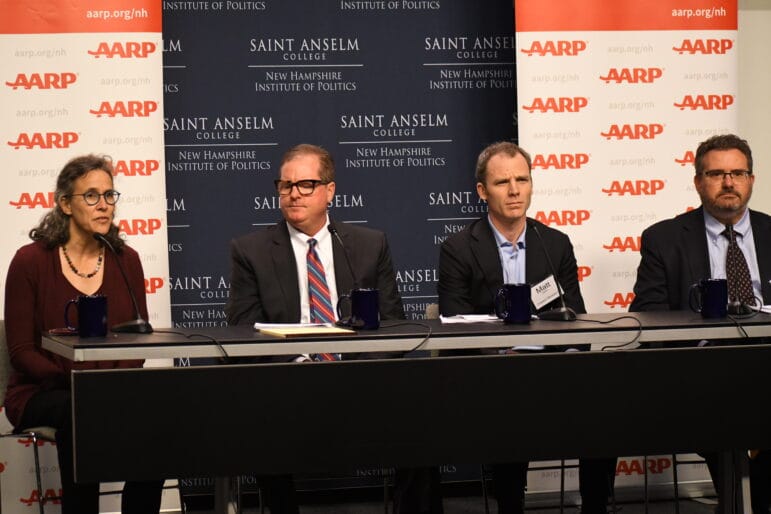Panel discusses importance of older New Hampshire mid-term voters
Moderated by AARP NH State Director Christina FitzPatrick, the discussion focused on a recent poll of 500 likely New Hampshire voters conducted by right-leaning FabrizioWard and left-leaning Impact Research on behalf of AARP, with an oversampling of respondents over the age of 50 among the 870 likel

GOFFSTOWN, N.H. – On Wednesday, AARP NH and the New Hampshire Institute of Politics at Saint Anselm College hosted a panel discussion looking at the importance of older New Hampshire voters in next month’s mid-term election.
Moderated by AARP NH State Director Christina FitzPatrick, the discussion focused on a recent poll of 500 likely New Hampshire voters conducted by right-leaning FabrizioWard and left-leaning Impact Research on behalf of AARP, with an oversampling of respondents over the age of 50 among the 870 likely voters reached by the two polling agencies.
In the poll, incumbent Republican Governor Chris Sununu and incumbent Democratic U.S. Senator Maggie Hassan led opponents Tom Sherman and Don Bolduc respectively, 55-41% and 52-45%. In the Second New Hampshire U.S. House District, incumbent Democrat Annie Kuster held a comparable lead over Bob Burns (53-43%), while incumbent Democrat Chris Pappas held a narrow 48-47% lead over Karoline Leavitt.
According to FabrizioWard’s Bob Ward and Impact Research’s Matt Hogan, the discrepancies in each race were largely dependent on candidate support from independents with the exception of the Pappas/Leavitt race where Leavitt holds a five-point lead among independents but Pappas holds a slight lead when it comes to party-base voters.
Hogan and Ward emphasized the importance of voters over the age of 50 in the election given the expectation that they will likely make up 60 percent of probable voters, although they both noted that there is less partisanship among older voters and more agreement on issues such as protecting social security, Medicare and financial topics, although they also noted that older voters are not a monolithic bloc.
“If (a candidate) isn’t talking about the issues that are important to (older voters), you’re really missing an opportunity,” said Ward, who also said that prescription drug prices may also be an issue to older voters.
Unlike other states where early voting plays a significant role, 87 percent of the respondents in the poll indicated that they will vote on Election Day, meaning candidates still have time to make up ground. Another difference in New Hampshire versus other states according to Ward and Hogan is the greater significance of rising utility costs to voters.
Hogan was also impressed at the level of voters in the poll who said they would vote for a member of one party for governor and another party for U.S. Senate, approximately ten percent, something almost unheard of elsewhere in the country.
“It’s pretty startling. It’s something that was more common in the past and was refreshing to see here,” he said.
Where New Hampshire is comparable to other states is that approximately three quarters of respondents indicated that they are dissatisfied with the course of the state or the country, with New Hampshire Institute of Politics Executive Director Neil Levesque that many New Hampshire voters appear to be supporting candidates they do not like due to fear of other candidates being even worse.
Levesque also noted that New Hampshire was unique in that most Granite Staters have had some form of contact with elected officials, going as far to call politics the state sport. Additionally, he said that television ads are the most important form of communication for voters except for voters who independently research on their own and also added that the reasons why voters choose candidates are more unique than many political analysts may assume.
“Individual people pick candidates if they like them or they are conveying something interesting to them,” he said.
The AARP poll can be found here.
